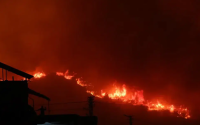By PATRICK E. TYLER
WASHINGTON, July 30 — Secretary of Defense Donald H. Rumsfeld's remarks today about what would be required to eliminate Iraq's weapons of mass destruction signaled an advanced state of debate inside the Bush administration — perhaps a reflection that time is getting short for decisions that have to be made if the goal is to take action early next year, before the presidential election cycle intrudes.
The defense secretary conceded in comments at the Pentagon that other means of dislodging Saddam Hussein were under consideration, among them diplomatic pressure to open his borders to United Nations inspectors and economic pressure aimed at turning his army commanders against him.
But in surveying the options in remarks Monday at a Suffolk, Va., military show and at the Pentagon today, Mr. Rumsfeld suggested that those other options were likely to be inadequate, and he emphasized the urgency of the threat and the futility of nonmilitary means for addressing it.
"A biological laboratory can be on wheels in a trailer and make a lot of bad stuff," he said. He added that any implication that the task of removing such weapons could be "done from the air" with bombers alone "is a misunderstanding of the situation."
In taking a more forward-leaning stance, the defense secretary appeared somewhat dismissive of the United Nations mission in Iraq, saying that its inspectors spent years "milling around the country" and only knew where to look for secret weapons caches "when prompted by defectors." United Nation's officials are likely to take issue with those remarks.
Mr. Rumsfeld's statements appeared to be calculated to press the case for a decision to undertake a large military operation in the Middle East at a time when most American allies and some members of Congress are nervous about instability there. Some American military commanders, under pressure to produce a workable war plan, also have expressed serious concerns about the risks of an all-out assault on Iraq.
The comments may irritate some allies in Europe, who argue that the American "obsession" with war planning, as one French official put it, was undermining the diplomacy being carried out by the United Nations secretary general, Kofi Annan. The United Nations is trying to force Iraq to open its border to a new legion of inspectors called for by the terms of Iraq's surrender at the end of the Persian Gulf war.
The defense secretary pressed his points in favor of ground action in Iraq a day in advance of Senate hearings on Iraq policy and the arrival of King Abdullah II of Jordan. By some accounts, Abdullah is still reeling from the jolt he received when he learned that the Pentagon's war planners were already looking at Jordan as a base of attack against Iraq.
Stopping in London on Monday on his way to Washington, Abdullah made it clear that he thought that would be a terrible idea and would not allow it, given that two-thirds of his population are Palestinians, already agitated over the crisis with Israel.
Yet Mr. Rumsfeld will be the administration's point man in guaranteeing that American military forces are ready should President Bush decide on the military option in coming months. War by its nature is a large industrial enterprise for which divisions and air wings have to be activated and millions of tons of weapons, munitions and supplies shipped half-way round the world. Therefore, Mr. Rumsfeld might be expected to be showing an elevated level of concern as a secretary of war who will be judged on whether he can accomplish his mission.
Top civilians in the Pentagon and State Department have encouraged Iraqi opposition groups to meet in a congress of sorts and to declare their unity and a common political program to replace the government in Baghdad with a democratic and pluralistic one allied with the West.
The Central Intelligence Agency also held high-level consultations with the leaders of the Kurdish minority that now rules in northern Iraq. Those leaders have told the United States privately that they would cooperate in a war to overthrow Mr. Hussein, but only if they see a major American military commitment to finish the job and to establish a new state in which the Kurds would have autonomy on their lands, full political representation in Baghdad, and a major share of the oil produced in northern Iraq.
Mr. Rumsfeld's deputy, Paul D. Wolfowitz, reported to Turkish leaders this month that America would protect the territorial integrity of Iraq if an invasion went forward. It was another sign that the Bush administration, while it has yet to make its case to the American public that it is necessary to invade Iraq — sooner rather than later — is making quiet diplomatic rounds laying the predicate for military action when Mr. Bush is ready to make a decision.
Changing the government in Iraq has broad support in Congress and among many Americans. That support has not been tested, though, by the unveiling of plans for a reserve call-up, the economic disruption of war mobilization and the impact war planning might have on economic recovery — as well as the prospect of American casualties.
At this stage, only Britain among America's allies appears willing to contribute forces or financing for what experts say could be an open-ended occupation of a country riven by ethnic and religious tensions.
Mr. Rumsfeld knows that most of America's allies want it to focus first on making progress to stabilize Afghanistan and to reduce the violence between Israelis and the Palestinians, whose images have inflamed the Middle East against American and Israeli policies. So he pushed back against the doubters, and even invoked the support of the Clinton administration by saying that the policy of government change in Iraq had been around a good many years and that both the Congress and "the prior administration opined on it."






